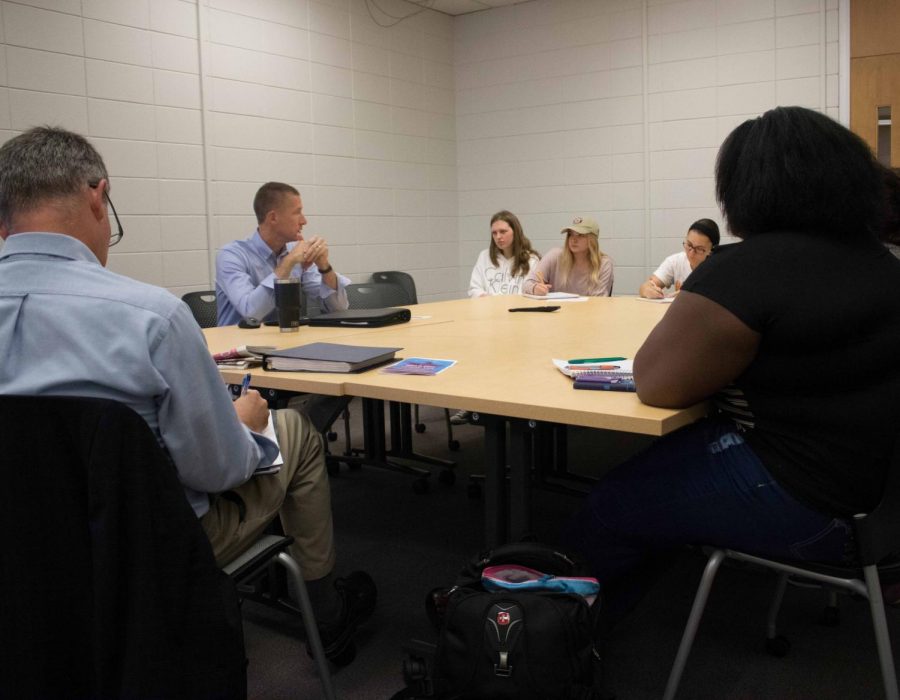Prof talks fundamentals of Iowa races
HAYLEY PALENSKY/Courtesy Photo
Professor Chris Larimer talks how the “fundamentals” play into Iowa politics during a Sept. 24 discussion.
Sep 27, 2018
Politics, parties, and personalities all came into play during a recent lecture at UNI.
On Monday, Sept. 24 at 4 p.m., political science professor Chris Larimer gave a speech titled “From the State House to Your House.” The lecture was sponsored by the American Democracy project, and was a part of the #PanthersVote campaign.
Larimer teaches political science at UNI and authors the “Politics in Iowa” blog hosted by KWWL.
Larimer discussed what he viewed as five key points about Iowa politics and the midterm elections: the “fundamentals,” partisanship, political geography, incumbency and personal traits.
“Talking to more people now with the state legislative races or the gubernatorial campaigns, these are the things I think about,” Larimer said.
Larimer said the fundamentals for the gubernatorial race between Democrat Fred Hubbell and Republican Kim Reynolds include Iowa’s economy and presidential approval ratings. The fundamentals for state legislative races, on the other hand, include the state economy and challenger strength. It also includes partisan polarization – the phenomenon of conservatives becoming more conservative and liberals becoming more liberal.
Following that, Larimer went on to discuss the question: does public opinion matter for the state legislature?
“If nothing else, on this one I would say it just has minimal effect on vote share,” Larimer said. “And what’s probably more important is that it really has no effect on reelection.”
Larimer said that a state legislator could have a voting record that is contrary to what polls well among their constituents, and it would reduce their chance of winning by a minimal margin. He felt uneasy about this disconnect between public opinion and who wins elections.
A central point was that partisanship matters.
Larimer discussed what will it take for voters to abandon their party this November? Larimer talked about how party identification comprises a large part of people’s personalities. He said switching parties would be the equivalent of a Chicago Bears fan cheering for the Green Bay Packers at Soldier Field.
“I see it as this ongoing experiment,” Larimer said. “It’s basically a political science experiment in real time. Because we’re seeing that voters have not abandoned their party yet, at least on the Republican side I think we still don’t know the answer.”
Larimer focused on the fact that, compared to federal elections — where voting and election trends are very predictable — state legislative elections have an element of unpredictability. He said that more and more, he keeps going back to the the fact that everything is being filtered through people’s own partisan lens.
“It’s getting harder and harder to sway voters.” Larimer said. “It’s getting harder to get voters to think about opposing viewpoints objectively.”
Towards the end, Larimer left time for students to ask questions, ranging from if it was difficult spending so much time studying the unknown, to why all of this information was important for student voters on campus.
“To have an understanding of the political landscape is really important to understand what sort of policies should we expect,” Larimer said. “What type of candidate do you want to support based on the policies that you want to see put in place?”














